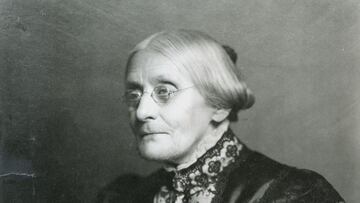Susan B. Anthony arrested for illegal voting in 1872: Who the activist voted for and where she cast her ballot
In 1872 women were not allowed to vote, but the social reformer and women’s rights activist broke the law to do so.


In 1872, women’s rights activist Susan B. Anthony decided enough was enough and went ahead and cast a vote in the U.S. presidential election—an act of civil disobedience that led to her arrest. Anthony, born in 1820, was a leading figure in the women’s suffrage movement, and was committed to challenging laws that restricted voting rights to men. At that time in the U.S. women were barred from voting. Her decision to cast a ballot in Rochester, New York, led to her being arrested and put on trial. The case made history and fuelled the women’s suffrage movement in America.
In Rochester, NY women put their “I voted” stickers on the gravestone of Susan B. Anthony. This year it is even more special. ❤️ #KamalaHarris2024🇺🇸 pic.twitter.com/8aTL6KoKPy
— ScholerinED (@ScholerinED) October 28, 2024
Who did Susan B. Anthony vote for?
Anthony voted for the Republican candidate in the 1872 presidential election, Ulysses S. Grant, who was running for re-election. His vice-presidential running mate was Henry Wilson. While Anthony identified primarily as an advocate for universal suffrage rather than as a party loyalist, Anthony saw the Republican Party as a promising vehicle for reform, particularly given its stance on civil rights and abolitionism following the Civil War.
Where did Anthony cast her vote?
Anthony cast her ballot in Rochester, New York, her hometown and a center of abolitionist and suffragist activity. She voted in the old Eighth Ward, a district in Rochester where she had previously rallied supporters for suffrage. Leading up to her vote, Anthony had canvassed local neighborhoods, encouraging other women to vote with her. She famously convinced a group of fellow suffragists—14 other women—to join her in this act of defiance.
In the days before the election, she and her colleagues approached election inspectors to assert their right to vote under the 14th Amendment, which guarantees the rights of all citizens. Despite initial resistance, the inspectors eventually allowed the 14 women to vote. However three weeks later, on November 18, 1872, she was arrested at her home by a U.S. Marshal on charges of illegal voting. The other women who had voted were also arrested but were not put on trial, unlike Susan B. Anthony.
As for me? I’m proud, joyous, inspired, feeling all Susan B. Anthony, on the right side of history, looking forward to a bright future and freedom for us ALL, thrilled to be taking my ballot to the post office today!!! #ConstantVigilance pic.twitter.com/5zInuR8IfM
— SUSAN BRANCH (@dearsusanbranch) October 28, 2024
Arrest, trial, and legacy of Susan B. Anthony
Anthony’s trial for illegal voting became a pivotal moment in the women’s suffrage movement. Held in Canandaigua, New York, the proceedings drew significant media attention and public debate. As in all criminal trials at that time, Anthony was barred from testifying in her own defense, depending on her lawyers to make her case.
The argument they made was that the Fourteenth Amendment to the Constitution makes it clear that women are citizens of the United States and the states are not allowed to make laws that affect the rights of citizens, which should include the right to vote. The prosecution argued that the only protected rights were to life, liberty and property, not to voting.
Judge Ward Hunt directed the jury to deliver a guilty verdict without deliberation. Anthony was fined $100, a sum she refused to pay, stating, “I shall never pay a dollar of your unjust penalty.” She made a famous speech despite being ordered by the Judge to stop.
Anthony had hoped to be imprisoned for refusing to pay the fine, in which case she would have been able to appeal, but Judge Hunt ordered that she not be taken into custody, denying her that opportunity.
Related stories
Anthony’s arrest and trial spotlighted the issue of women’s suffrage nationwide. Though she was convicted, her act of defiance and subsequent trial raised further awareness of the lack of rights of women under the U.S. Constitution. Anthony continued to campaign for women’s suffrage, giving speeches across the country and working tirelessly until her death in 1906.
For the first time, voters are casting ballots at the home of Susan B. Anthony in Rochester, NY. Quite a contrast from 1872, when she was arrested at the home for casting a ballot in the presidential election. She didn't live to see women granted the right to vote in 1920. pic.twitter.com/DUlVnPJ5NJ
— Hoodlum 🇺🇸 (@NotHoodlum) October 31, 2024
Women get the vote in the United States
It would take almost 50 more years from the time of her trial, but the movement Anthony championed finally succeeded in 1920 with the ratification of the 19th Amendment, granting women the right to vote. Her illegal vote in 1872 and subsequent arrest remains a symbol of the struggle for equal rights and a powerful reminder of the sacrifices made by early suffragists in the pursuit of justice and equality for women.


Complete your personal details to comment